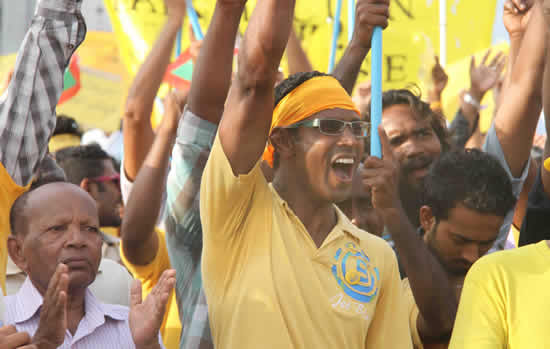
A supporter of former Maldives President Mohamed Nasheed shouts slogans during a rally in Male, Maldives, Feb. 17, 2012. Some 10 thousand supporters of former Maldives President Nasheed took part in a mass rally calling for an early election. (/Che Hongliang)
The wave of populist uprisings has now hit South Asia. This time, the democratically elected leader of the Maldives has been ousted by an intimidating combination of radical Islamists, police, and military dissenters.
On February 7, dramatic protests broke out in the Maldives, an island nation just south of India. They led to the “involuntary” resignation of President Mohamed Nasheed. With many civilians furious over Nasheed’s decision to arrest Criminal Court Chief Judge Abdulla Mohamed under suspicion of corruption, Nasheed claims that officers of the police force and the Maldives National Defense Force demanded he resign or face “a bloodbath in the capital.”
These police and security forces joined with anti-government protestors under the guise of defending Islam, which they argue had been disrespected under Nasheed’s presidency. However, international observers fear that this is just a ploy to use religion as a means to “further their political ends.” Vice President Mohammed Waheed Hassan has been sworn in as the interim president and vowed to create a multi-party unity government in which Islam can flourish.
Many question whether President Waheed is genuinely committed to establishing a multi-party government. There are also concerns that he may struggle to retain authority over the radical Islamists, police, and military, which could lead to the strengthening of the military’s role in politics, much like in Pakistan.
The Maldives is a small country of fewer than 400,000 people, but the U.S. should remain cognizant of developments there. The Maldives is located in a critical geostrategic area in the Indian Ocean amid heavily frequented shipping lanes.
The U.S. State Department was perhaps too quick to recognize the Maldives’ new government without considering the consequences for democratic development in the country. State Department spokeswoman Victoria Nuland backtracked slightly from State’s original position of fully endorsing the new government on Friday when she said, “We will work with the government of the Maldives, but believe that the circumstances surrounding the transfer of power need to be clarified.”
U.S. Assistant Secretary of State for South and Central Asian Affairs Robert Blake visited the Maldives this past weekend and called for an independent investigation into the events leading up to Nasheed’s resignation. Blake also urged the country not to hold early elections: “Members of civil society told me that the country is not ready for early polls because the police, the Election Commission and judiciary, are not sufficiently prepared to ensure free and fair elections.”
Events in the Maldives bear watching, since there are implications for broader trends in the region involving democratic development and defining the role of Islam in society. Heritage Foundation senior research fellow Lisa Curtis explained:
There are several questions surrounding the removal of Dr. Mohammed Nasheed and what it means for the future of democracy in the Maldives. Since Nasheed was elected to the presidency in 2008 in the country’s first direct presidential elections, there are valid questions about whether his abrupt dismissal from office was in line with the constitution that was adopted four years ago. The destruction of historical Buddhist and Hindu relics at the Maldives’ National Museum during the political crisis also raises concerns as it conjures up memories of the Taliban’s vicious destruction of Buddhist statues in Afghanistan in the late 1990s. Although the Maldives may not be at the top of U.S. foreign policy concerns, Washington does have an interest in seeing democracy and pluralism thrive in this island nation that occupies an increasingly important strategic space in the Indian Ocean region.
Melanie Passons is currently a member of the Young Leaders Program at The Heritage Foundation. For more information on interning at Heritage, please visit: http://www.heritage.org/about/departments/ylp.cfm























